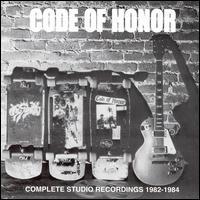When someone references the burgeoning California punk scene of the early 1980s, there's a handful of bands that are inevitably always name-dropped. Bands like Circle Jerks, TSOL, Agent Orange, Dead Kennedys, the Adolescents, X, Black Flag, and Fear have become common benchmarks when revisiting the history of the California punk scene. One band that is almost always left out is San Francisco's Code of Honor, a band that interestingly enough, shared the stage with every single one of the aforementioned bands.
Their Complete Studio Recordings 1982-1984 follow Code of Honor from an aggressive 80s hardcore/skatepunk band through their later years as they incorporated more experimental elements as classic rock influences and new wave. The youthful angst of the opening track "What Are We Gonna Do?" is spat out through the spoken word breakdown, "Here we are, a small group of kids who realize our government is fucked, but what are we gonna do? WHAT ARE WE GONNA DO?" In the traditions of peers and followers like Minor Threat, Fifteen, Pennywise and Good Clean Fun, track four is the "band track," "Code of Honor" which seems to serve as the band's manifesto, stated in the same spoken-style of vocals as the first track:
Your self-determination is more important than your life / Don't regret what you've done yesterday, life's in your hands but it's only today / It's better to die than to live a fucking lie / Never desert your comrade in need, in danger, or in trouble / [...] / Be your own advisor, choose your own castle, make your own decisions, be true to your own goals / It's better to die than to live a fucking lie, ITâS BETTER TO DIE!As the album progresses, the band's changing styles become apparent. The hardcore punk is gradually toned down as new styles move in. "House of Others" is the album's longest track at 4:41, with a slower, heavy bassline, spaced-out guitar work and slightly synthesized vocals. Although the music changes significantly from start to finish, the overtly political lyrics are maintained as the constant theme, even as the band explores the wah-wah effects of the classic rock style in "This Day."
After listening through the tracks a few times, it's difficult to understand why Code of Honor never broke out with more success like some of the other bands of the time. They were aggressive, edgy, and unique. Thankfully, Code of Honor will live on through their Complete Studio Recordings and reach listeners who weren't even born when they were making music. Who knows, maybe someday we'll be hearing "Code of Honor" name-dropped on the list of early California punk legends they deserve to be on.
